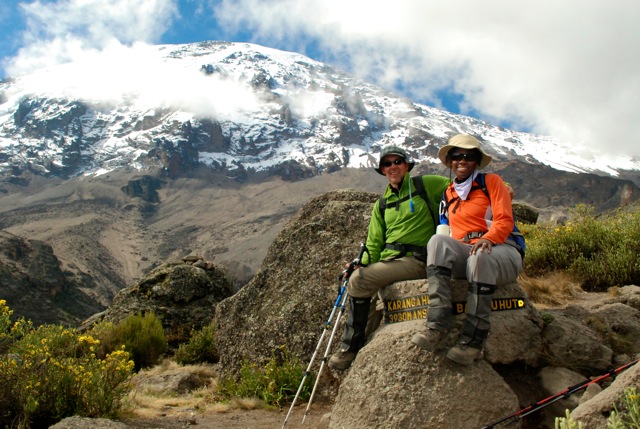Dr. Adams and Dr. Hessel achieved their goal this summer of summitting Mount Kilimanjaro on the morning of August 22nd. Kilimanjaro is the highest point in Africa at 19,800 feet. Prior to our climb, we were briefed by one of our guides about the four key principles needed to successfully reach the top. Upon reflection, these same principles apply not only to climbing mountains but also to life in general. These principles are as follows.
We would like to thank a number of friends and family for helping us reach the summit. In particular, Renee Little was very helpful in planning our dietary requirements for optimal training. Dr. Andre Botha for his personal insights as a veteran climber of Kilimanjaro. Amanda Reimer for helping with personal training, and the team at the Wellness Centre for their daily encouragement.
- Drink lots of water to stay hydrated - We are essentially made of water and we often take it for granted. On the mountain, dehydration limits our ability to carry oxygen and adapt to the elevation gains. The thin, dry air and increased respiration contributed to a rapid loss of moisture from our bodies. Clean water was of limited supply both on and off the mountain. We realized how much we take for granted our easy access to an abundance of clean water at home.
- Have good equipment - The harsh climate and temperature made us aware that we needed a lot of gear to keep our bodies protected. When you were cold, you added another layer. When the wind picked up, you put on a windbreaker. The second principle is really about listening to your body's needs and using good equipment or being aware how the environment affects our bodies.
- Take your time and walk slowly - Our Tanzanian guides emphasized that one always walks slowly on the mountain to prevent getting high elevation sickness. The Swahili phrase for walking slowly is "pole, pole" (pronounced poli, poli). As climbers, we had to respect our own pace and not get caught up with a faster pace of another group of climbers. Sometimes in our fast paced lives we forget to take the time to slow down and pay more attention to the world around us.
- Practice “PMA” - Charles, the head guide, mentioned that PMA is short for Positive Mental Attitude. He believed that maintaining a PMA was the most important principle necessary to summit. Many of the hardships we faced on the mountain were made bearable by looking at them with a positive attitude. Getting up at midnight to climb for 7 hours uphill in complete darkness, in below freezing temperatures and howling winds does not appear positive on first blush until you think about the end result of experiencing a sunrise above the clouds. The magic of Kilimanjaro is that it makes you aware of the importance of keeping a positive frame of mind.
We would like to thank a number of friends and family for helping us reach the summit. In particular, Renee Little was very helpful in planning our dietary requirements for optimal training. Dr. Andre Botha for his personal insights as a veteran climber of Kilimanjaro. Amanda Reimer for helping with personal training, and the team at the Wellness Centre for their daily encouragement.


 RSS Feed
RSS Feed
